Are Boxers Good Family Dogs? Pros & Cons

Updated on
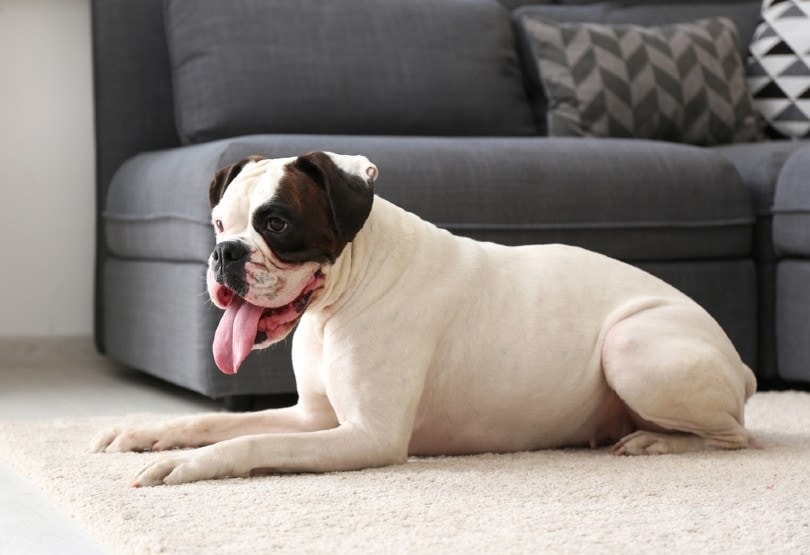
The American Kennel Club says the Boxer’s “virtues alone are priceless if the dog is to become part of his master’s family, which he should for the well-being of all concerned.1” Indeed, it is impossible not to love and want the high-spirited Boxer dog breed and the most faithful friend a family could have!
Boxers rank eighth among the world’s most popular breeds, and it’s no surprise: they are joyful, fun, clever, fiercely loyal, and undeniably adorable.
However, potential parents need to weigh the decision to introduce a boxer into their families and homes carefully if they want to coexist happily.
Are Boxers Good With Kids?
Every family person will want to know their children’s safety around dogs, and you’ll be glad to know that Boxers reserve their affection, especially for kids (and the elderly). These dogs demonstrate the need to be more patient and gentle with these fragile beings, although some dogs demonstrate better than others.
For instance, an adopted Boxer’s disposition and ability to bond with kids depends on its upbringing. While those raised in a household with kids will feel comfortable being around your kids, those who meet them may shy away from them during the first days.
A boxer has the goofiest and most playful personality that charms kids with proper introduction. And, if your child loves to play outdoors, the better! Boxers are energetic and prefer channeling some of the energy running around, jumping, and goofing around with family in the yard all day.
These dogs tend to be clumsy and bowl over kids when they are excited or playing. However, they are very knowledgeable and tend to be careful not to harm their family members during play. It’s why they get along with kids and even babies, although it is still vital to supervise the interactions from time to time.
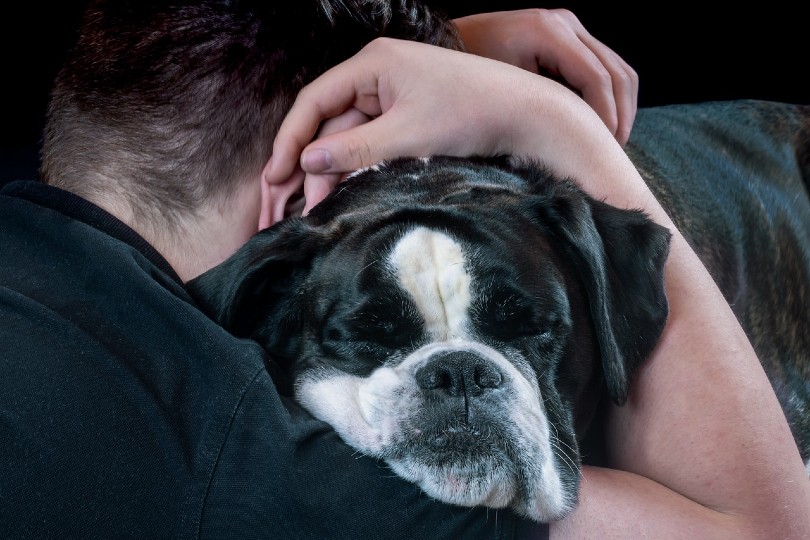
Are Boxers Good With Other Dogs?
You don’t have to worry about aggression in a well-bred and socialized Boxer at any moment. If your pup is temperament-tested and adequately socialized right from puppyhood, it’ll bond and form friendships with other pets very well, especially dogs.
Boxer breeders and rescuers also agree that a Boxer will enjoy the company of another Boxer even more, or better still, the opposite sex (spayed and neutered male with female) is the best placement.
But if you purchase your pup from a substandard breeder, your Boxer may fail to display this friendliness to other household pets. A Boxer with little socialization and training tends to instinctively chase smaller pets like cats because it may view them as “prey” even if they share a home.
Why Are Boxers Are Good Family Dogs (7 Reasons)
1. Boxers Have Your Back
The most appealing aspect of this breed is how loyal and protective they can be with their families. Boxers tend to be wonderful watchdogs and terrific guardians of the people they love, thanks to their ancestry as the herd and hunting dogs.
Plus, these pets can be a little bit territorial, so be sure that your dog will bark and protect everything in its territory when it senses suspicious activities.
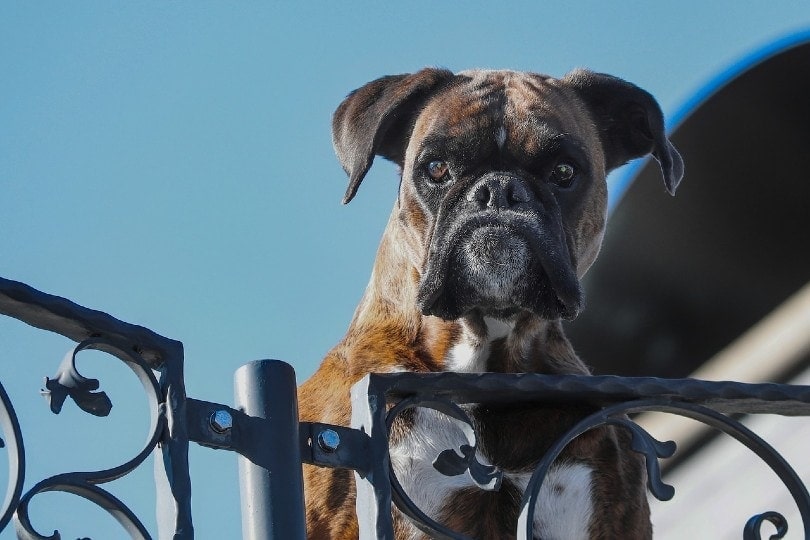
2. They Love, Not Fight
The Boxer dog breed can be suspicious and keen around strangers but is not aggressive. Expect a well-socialized Boxer to be happy and friendly around the people he knows and loves. This dog typically loves human attention and affection, and although their muscular bodies make them look aggressive at first glance, that’s where it stops.
3. Boxers Are Goofy and A Little Mischievous
These dogs are free-spirited, cheeky, and intelligent enough to discover well-hidden treats. A Boxer’s cheerful and curious nature makes them silly and naughty, and all he’d want is to explore, play games, and entertain his family with his goofiness.
Boxers require lots of training, structure, and mental and physical stimulation if you want them to be well-behaved. Look out if your pet remains bored and unstimulated for long because he can do a lot of damage. These goofballs tend to be calmer as they get older, with their happy outlook intact, of course.

4. Boxers Are Natural-Born Athletes
What would you expect from a dog breed that started as a police dog? Boxers are robust dogs with swift limbs. Their ancestors were among the earliest guide dogs who trained for police work.
This is why Boxers are always down to play, good at agility training, herding, and quite athletic. They can even stand on their hind legs and ‘box’ (paw at you) to get you to play with them. These traits made these pups serve in the German military during WW1 as messengers and scouts.
5. Boxers Learn Quickly
The good thing about Boxers is that they are an intelligent lot, and you can easily train them for agility, obedience, and even working dogs. It would be best to start training a Boxer during his puppy stage, provide positive reinforcement during the process, and be patient.
A Boxer lives to please its human, so be sure it’ll learn how to behave and interact with the household sooner than you expect.
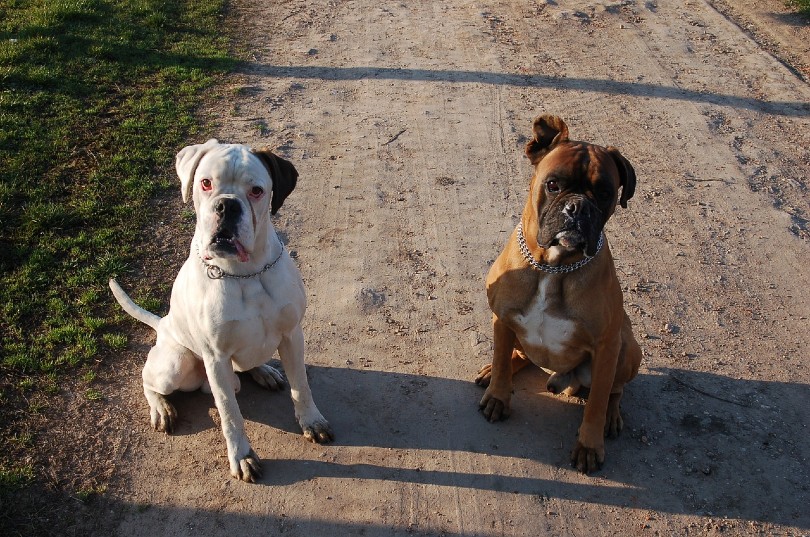
6. Boxers Are Patient Dogs
A well-trained Boxer is patient and tolerant with children and other people, displaying the ability to wait stubbornly for the people he loves.
7. Boxers Are Professional Snugglers
All a Boxer wants is to hang out with you, and they can be champion snugglers to prove it. These dogs are the coziest and most perfect nanny for your children.
Boxers may look intimidating due to their large body build, but beyond this appearance lies a dog that quickly bonds with its family and shows affection in various ways, including cuddling. Physical contact is a huge one for this pooch, and it can be as subtle as sitting right next to you on the couch or leaning in to ensure your bodies are touching.
As funny as it looks, Boxers boast of giving “actual” hugs!
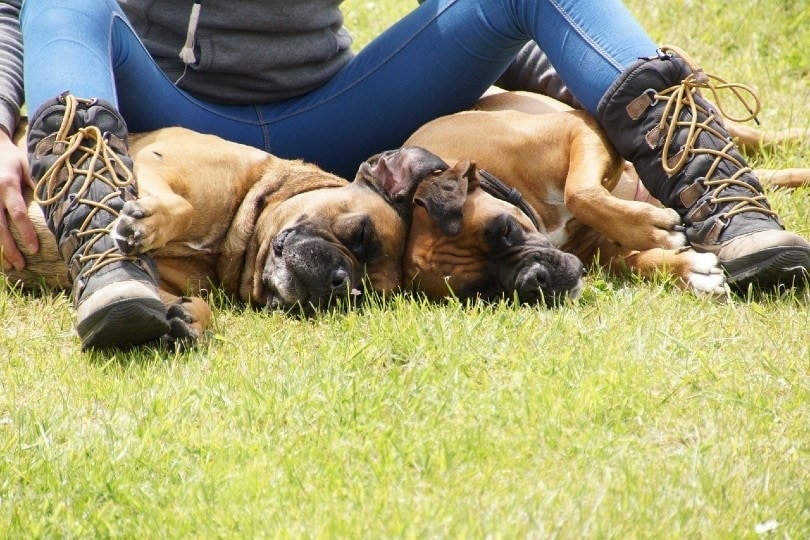
Are Boxers Good For First Time Owners?
Boxers Can Drool!
Boxers tend to pass a lot of gas (flatulence), give slobber and wet kisses, and snore. Generally, these pups are droolers, and it’s perfectly normal.
However, they can make a real mess at the food bowl and love to give the people they love sloppy wet Boxer kisses. So, if the thought of any of these traits makes you wince, you are not right for a Boxer.

Rowdiness When Young
Most owners only notice the beauty and get a puppy Boxer because of how cute, adorable, and active he appears. However, as precious as puppy Boxers are, they never grow out of their puppyhood!
Boxers take time to mature and act like puppies and not “settle down” until they are 3 or 4 years old. Since they are pretty energetic and active, they tend to jump exuberantly and knock over kids and even adults during playtime.
May Not Notice Boundaries
While Boxers are friendly, affectionate, and playful breeds, they may not always notice boundaries and the essence of space in a home. In his adolescence and adult years, a Boxer is not easy to handle, especially for the novice, impatient, or unprepared parents.
This dog grows into a big cuddly animal that requires most of your time and attention. It can be an “in-your-face or shadow” breed, often following you from room to room, crawling in your lap, jumping on you, and even waking you from a nap to do so.
Boxers Are Prone to Several Severe Health Issues and Short Lifespan
Perhaps, the biggest challenge of owning a Boxer is that parents should always be ready for unplanned vet visits, besides the usual annual check-up for vaccinations and heartworm tests.
This dog is prone to cancers such as lymphoma and mast cell tumors, “bloat, cardiomyopathy, and skin issues like allergies and mange. For this reason, the lovable Boxer often lives for only 8-10 years, not a long time compared to other dog species.
Boxer Care & Needs
1. Exercise
Boxers are bred for stamina and strength and require committed and capable owners to help meet their agility requirements. Although they may not chase animals in the field or hunt for food in the wild anymore, they still possess the instinctual need for the same amount of regular work-out.
Whether you do it yourself or call for a sitter, ensure your pup does not stay inside all day. It may unleash its excess energy on destroying furniture, barking endlessly, chewing destructively, and knocking over everyone during playtime.
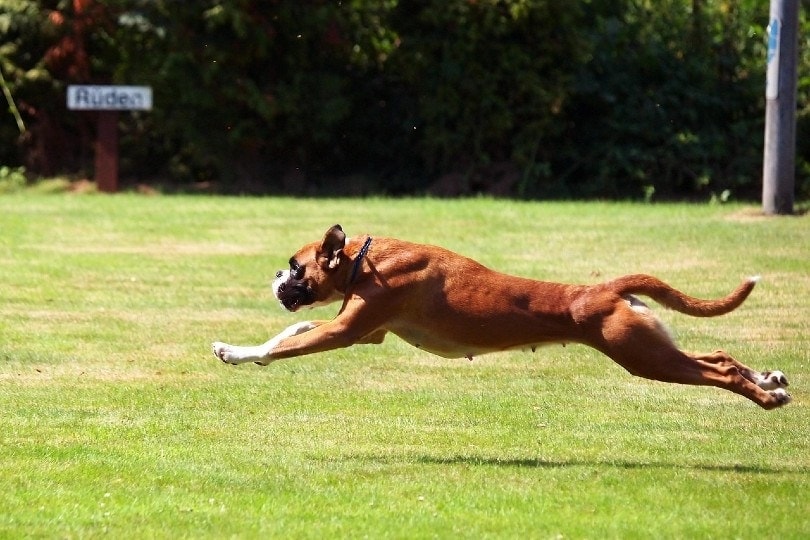
2. Training
These pooches require obedience training to model their manners and adjust to a new family. Boxers can be a bit stubborn, which people sometimes mistake as being “dumb:” although their extreme intelligence makes them discover alternative training tricks.
For this reason, ensure you stick to short and non-repetitive training because these dogs do not respond well to repetition. The training routine should be fun, without violent reprimands, which can trigger aggressive reactions.
3. Chewing
You must offer your pup stimulating chew toys because Boxers love to chew. These canines can chew anything, from coffee tables, shoes, remote controls; it’d be best to offer a chewing outlet like a toy or delectable treats.
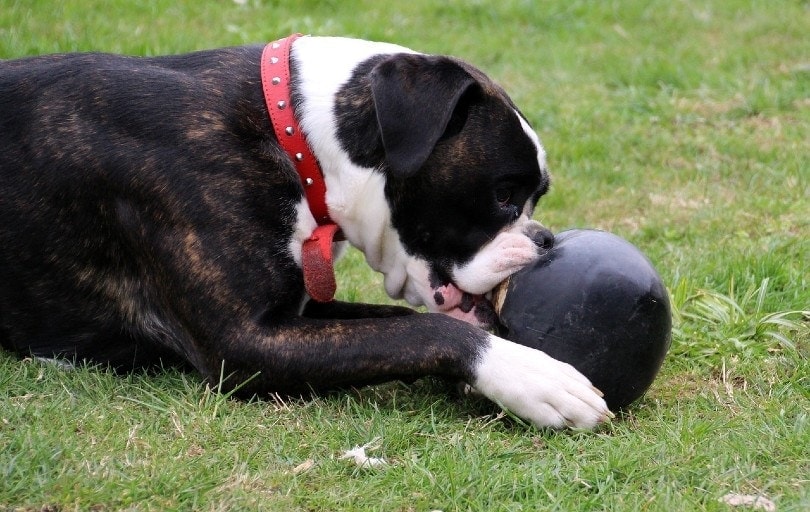
4. Affection
Boxers hate staying home alone all day, as they are more in the “people dogs” category. They love the company of adults and kids and demand as much interaction as possible.
It’s uncommon for families to acquire two Boxers to keep each other company when no one is home. Another pup will help diminish destructive behavior due to boredom.
5. They May Need Sunscreen
White Boxers, just like other white dog breeds, tend to burn in the sun, which increases their risk of skin cancer. So, if you own such a Boxer, you can use sunscreen, as long as it does not contain zinc oxide because it is toxic for pups. Ask your vet to recommend the most suitable skin protection for your dog.
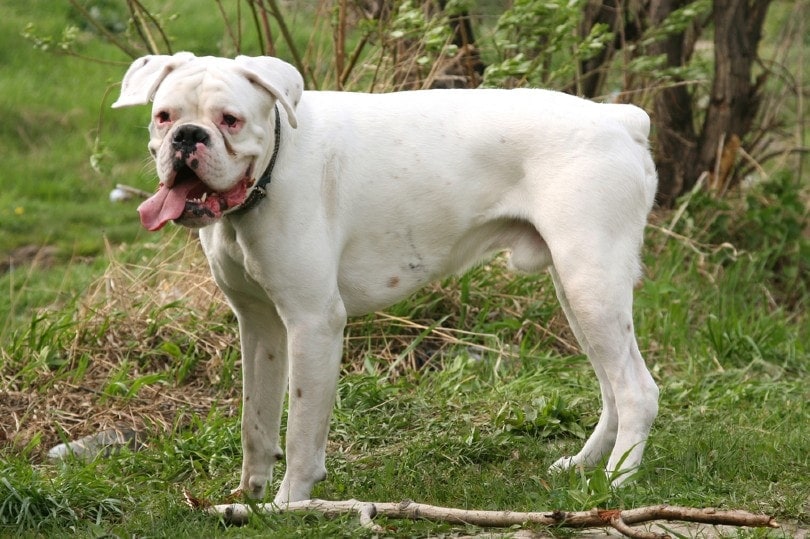
Summary
An older person living alone may not appreciate a Boxer’s rowdiness and muscular bounciness, while a busy young couple may not afford to leave a Boxer alone when they go to work all day. However, a well-trained and well-bonded Boxer can thrive in a family with children as long as they are old enough to play with a robust, energetic dog.
Featured Image Credit: Pixel-Shot, Shutterstock














